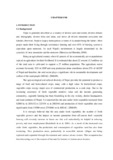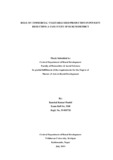Please use this identifier to cite or link to this item:
https://elibrary.tucl.edu.np/handle/123456789/3487Full metadata record
| DC Field | Value | Language |
|---|---|---|
| dc.contributor.author | Poudel, Kaushal Kumar | - |
| dc.date.accessioned | 2021-07-26T06:36:25Z | - |
| dc.date.available | 2021-07-26T06:36:25Z | - |
| dc.date.issued | 2011 | - |
| dc.identifier.uri | http://elibrary.tucl.edu.np/handle/123456789/3487 | - |
| dc.description.abstract | A study was conducted in the rural remote district Rukum to assess the comparative advantages of commercial vegetable seed production and its impact on poverty reduction of the farmers family during May 2010. Rukum is one of the remotest district of Rapti Zone, Mid-Western Region and it has about three decades of vegetable seed production history. About eight hundreds family from ten VDCs has been engaged in seed production business; out of ten the study covered fifty farmer families of three VDCs. The seed production trend shows the highest production up to one hundred seventy metric tons and the last year production was only forty metric tons. It shows the declined situation of the production. Since the district had earned name as a major vegetable seed producing district in Nepal; in the mean time conflict effect in group strengthening and mobilization and the empowerment of group dynamism could not work to make the business sustainable. The study assess the benefit cost analysis of two commercial vegetable seed crops radish and onion with the traditional crop wheat to find out the comparative advantages. The benefit cost ratio was 2.10, 1.89 and 1.15 of onion, radish and wheat respectively. The result shows that the vegetable seed crops were comparatively advantageous over wheat. The gross income of Rs. twenty thousands, six thousands and two thousands of onion, radish and wheat respectively from one ropani of land indicates the better income from vegetable seed to support the rural livelihood in terms of food, clothes, education and health. In assessing the role of vegetable seed in poverty reduction, most of the farmers reported that their food habit; shelter condition; education condition and saving condition has been changed positively after joining the vegetable seed production business. The finding was interesting; out of total respondents 96 percentages reported that they have changed their food habit towards the nutritious food specially the regular use of meat, daily use of milk and green vegetables. Forty two respondents reported they have changed their housing condition after they get surplus income from vegetable seed; out of total 98 percentages reported that they changed in their children education condition after doing seed business; and out of total respondents 62 percentages reported that they have now saving fund for the emergency. They have repaired their houses; enrolled girls in the school and some reported they transferred their children in private from public school; use of nutritious food like meat and green vegetables and most of them have emergency saving fund and some mentioned that they do not have saving but no need to go to the landlords for daily use expenses of farm. The major problems reported were marketing, transportation, lack of inputs, lack of technology support and lack of irrigation facility. Marketing has been reported as a number one major problem in vegetable seed business. Due to the weak institutional set up the single farmers are facing marketing problems; so the marketing of seed should be handled either by cooperatives or contract farming. Among these problems some are related with the technical concern and some with the policy concern so considering these problems some recommendations have been made for concern agencies, farmer groups and technicians in the paper. Since the area has been developing as a commercial vegetable seed pocket; farmers have been adopting it as a high value crop; livelihood has been changed positively; so its sustainability for future should be the major concern of the concerned authorities. | en_US |
| dc.language.iso | en_US | en_US |
| dc.publisher | Central Departmental of Rural Development | en_US |
| dc.subject | Vegetables | en_US |
| dc.subject | Poverty | en_US |
| dc.title | Role of Commercial Vegetable Seed Production in Poverty Reduction: A Case Study of Rukum District | en_US |
| dc.type | Thesis | en_US |
| local.institute.title | Central Department of Rural Development | en_US |
| local.academic.level | Masters | en_US |
| Appears in Collections: | Rural Development | |
Files in This Item:
| File | Description | Size | Format | |
|---|---|---|---|---|
| Chapter.pdf | 521.27 kB | Adobe PDF |  View/Open | |
| Cover.pdf | 40.86 kB | Adobe PDF |  View/Open |
Items in DSpace are protected by copyright, with all rights reserved, unless otherwise indicated.
